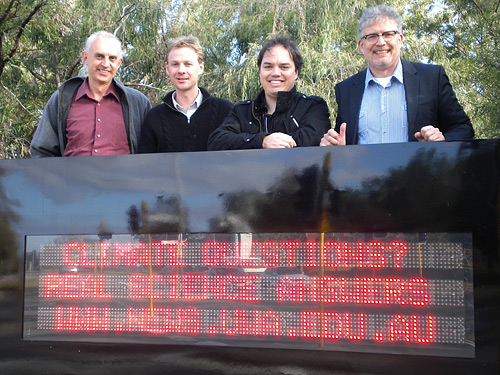
Left to Right: Kevin Judd (Professor, School of Mathematics and Statistics), Matt Hipsey (Assistant Professor, School of Earth and Environment), John Cook (blogger, School of Hard Knocks), Stephan Lewandowsky (Professor, School of Psychology)
On Monday night was the Public Forum on Climate Change, hosted by the University of Western Australia and presented by local scientists. The driving force behind the event was Stephan Lewandowsky, a cognitive scientist at UWA who worked tirelessly over the last month to organize the event. Stephan also invited me to come over and offer some Skeptical Science assistance.

Left to Right: Kevin Judd (Professor, School of Mathematics and Statistics), Matt Hipsey (Assistant Professor, School of Earth and Environment), John Cook (blogger, School of Hard Knocks), Stephan Lewandowsky (Professor, School of Psychology)
Early Monday morning, Stephan and I headed over to local radio station RTR FM for an interview about the event. Straight up, the interviewer asked me what I thought was the most convincing skeptic argument. Tough question to answer! On the way back to campus came the news that local rag The West Australian had ran a small piece about the event in the morning edition. The emphasis was on small but nevertheless was generating a lot of enquiries at the university.
The first speaker was Stephan who spoke of the perils of ignoring scientific consensus, using South African President Mbeke's policies on AIDS as a cautionary tale. I also enjoyed his expounding on "the joys and rewards of true skepticism". By true skepticism, he means taking in all the evidence before coming to a conclusion, a definition I also subscribe to.
Next was Kevin Judd, an expert in climate modelling. Kevin spoke about the difference between "junk science" and real science - that junk science consisted of cherry picking select pieces of data while real science looks at all the data. Again, a theme I expound upon regularly here - I've pretty much beaten the "small piece of the puzzle" metaphor to death (that doesn't mean I'm going to stop using it).
Kevin was followed by Malcolm McCulloch, a coral reef researcher. He went into some detail about ice age cycles and why CO2 lagged temperature by roughly 800 years in the past. My interest was piqued by some of his own research discovering another "human fingerprint" - the level of carbon 13 in coral reefs (I later asked if he could email me his research - expect a post on this soon).
Last up was Volker Oschmann, a German government official who over the last ten years has been in charge of Germany’s renewable energy legislation. Volker's talk was a refreshing change of tack as he outlined the exciting developments in Germany, a country that had long accepted humans were changing climate and were hard at work doing something about it. It was an appropriate way to finish off the 4 talks, exploring the practical way forward. Really, the whole evening should've been about solutions and it's a crying shame 3/4 of the content had to be about the evidence we're causing climate change rather than ways we could be fixing it.
Volker explained how Germany had actually reduced their CO2 emissions in recent decades while at the same time, their economy got stronger. Over the same period, Australian CO2 emissions have increased. It was a bit embarrassing as an Australian, considering the potential our country has for solar and wind energy. But at least Volker didn't begin his talk with the slide "4 - 0" which he'd reportedly used last week, shortly after Germany had annihilated Australia at the World Cup.
The fun began when we opened it up to questions. Predictably, there were a few hard hitting skeptics in the audience. As the questions came, I was poised over the Skeptical Science website, ready to jump to the relevant graphs to be displayed up on the cinema sized display. My favourite skeptic argument of the evening was a new one to me (and I thought I'd heard them all). One audience member asked Malcolm if CO2 lagged temperature rise by 800 years, wasn't the current CO2 rise just a lagged response to the Medieval Warm Period? Malcolm was initially staggered at the implausibility of the idea but gathered himself quickly and on the fly, calculated that any ppm rise from the estimated MWP warming would be at most 10 ppm (the actual rise from pre-industrial levels is around 100 ppm). Later he mentioned to me 10 ppm was probably an overestimate. < /p> < p> The number of people attending the event was encouraging. Noone thought to actually count numbers but at the post mortem, the general consensus was around 150 to 200. A lot of credit for this must go to Stephan. In his preparations to organize and promote the event, he left no stone unturned. It was great to get the scientists who are actually doing climate research out there communicating their science to the public in clear, understandable terms - something that needs to happen more often.
Note: the video isn't ready yet but the plan is to post full video of the event at www.uwa.edu.au/climatescience.
Posted by John Cook on Wednesday, 30 June, 2010
 |
The Skeptical Science website by Skeptical Science is licensed under a Creative Commons Attribution 3.0 Unported License. |